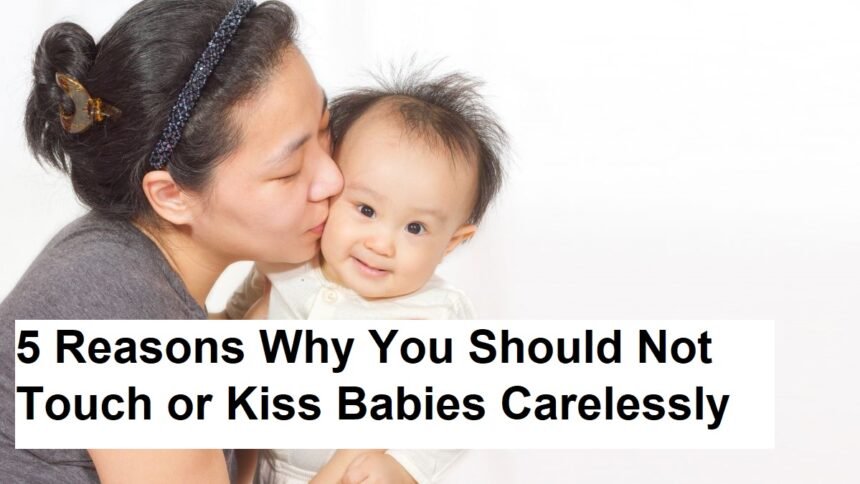Introduction
Babies are tiny, delicate beings that require special care and attention. They are also highly vulnerable to infections and health risks, which is why new parents, family members, and visitors are often advised to exercise caution when it comes to physical contact. While kissing and touching babies are natural ways to show love and affection, doing so without proper hygiene or caution can sometimes lead to health complications for the infant. Here are five important reasons why you should not touch or kiss babies carelessly.
1. Babies Have Weak Immune Systems
Newborns and young infants have developing immune systems that are not yet fully capable of fighting off infections. Their immune responses are less effective, making them more prone to catching illnesses from external sources.
Why it matters:
Many diseases and infections that are usually harmless or easily manageable in adults can become serious or even life-threatening for babies. Touching or kissing a baby with unclean hands or mouths increases the risk of transmitting viruses and bacteria such as cold sores, flu, or gastrointestinal infections.
Precaution:
Always wash your hands thoroughly before touching or kissing a baby. Avoid contact if you or your child are sick, have cold sores, or show any signs of infection.
2. Risk of Transmitting Cold Sores and Other Viral Infections
Cold sores caused by the herpes simplex virus are common, but they are especially dangerous for babies. The virus can easily spread through saliva, skin contact, or even sharing utensils.
Why it matters:
In infants, herpes simplex virus can cause severe infections such as skin outbreaks, eye infections, or even encephalitis (brain inflammation). These conditions require urgent medical attention and can have long-lasting health implications.
Precaution:
Refrain from kissing or touching babies on the mouth, face, or hands if you have cold sores or suspect you might be infected. Avoid sharing cups, bottles, or utensils with infants.
3. Risk of Allergic Reactions and Skin Infections
Infants have sensitive skin that can easily react to external stimuli. Touching or kissing a baby with dirty or unwashed hands can introduce bacteria, fungi, or allergens that may cause skin infections or allergic reactions.
Why it matters:
Skin infections such as impetigo or ringworm can spread quickly among babies and even to caregivers. Allergens on hands, such as pollen or pet dander, can also trigger allergic reactions or respiratory issues in sensitive infants.
Precaution:
Maintain good hygiene by washing hands and trimming nails before handling a baby. Keep the baby’s environment clean and free from potential irritants.
4. Unintentional Stress and Discomfort for the Baby
Babies can get overwhelmed easily, especially when they are tired, hungry, or unwell. Unfamiliar or overly enthusiastic contact can cause discomfort or stress to infants.
Why it matters:
A crying or fussy baby may be trying to communicate discomfort. Touching or kissing them forcefully or excessively can increase their distress and make them feel insecure.
Precaution:
Pay attention to the baby’s cues. Let the baby come to you and respect their boundaries. Approach gently, speak softly, and always observe their reactions.
5. Promoting Good Hygiene and Preventing Disease Spread
Good hygiene is vital for protecting babies from preventable illnesses. Careless touching or kissing without proper hygiene practices can facilitate the spread of germs within the household or community.
Why it matters:
Infections such as norovirus, influenza, or even bacteria like E. coli can be transmitted via hand contact and saliva. Keeping a hygienic environment minimizes the risk of illness and helps the baby develop immunity gradually.
Precaution:
Practice regular handwashing with soap and water. Use hand sanitizers when soap and water are unavailable. Encourage family members to cover their mouth and nose when coughing or sneezing, and avoid contact with the baby if they are unwell.
Final Thoughts
Showing love and affection to a baby through touch and kisses is natural, but it should be done with caution and awareness of the risks involved. Respect your baby’s signals, prioritize hygiene, and avoid contact when you or the baby are unwell.
Protecting your little one from preventable infections is an essential part of caring. By following these precautions, you can ensure your baby is safe, healthy, and happy during their crucial early months of life.












